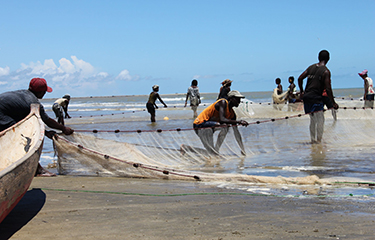The global effort to harness the potential of small-scale fisheries to achieve sustainable food systems and eliminate poverty has led to the launch of the Small-Scale Fisheries Resource and Collaboration Hub (SSF Hub) by a global coalition involved in various operations along the entire seafood value chain.
“The SSF Hub is a multilingual, interactive online platform to strengthen small-scale fisheries governance and community development,” according to the Environmental Defense Fund (EDF), one of the organizations involved in forming the new entity.
Seafood industry players with interest in small-scale fisheries will be able to access a wide range of information via forums, tools, videos, and case studies posted on the new hub.
“The SSF Hub will connect fishers and other stakeholders around the world to learn from each other, share information, and ultimately promote improved well-being, sustainable use of the sea and improved freshwater and marine nature conservation,” said Simon Cripps, executive director of Marine Conservation for the Wildlife Conservation Society, another member of the global coalition of partners that launched SSF Hub.
In addition, through the SSF Hub, seafood industry players now have an opportunity to “share their stories and experiences with their peers around the world and to access the latest innovations and research about small-scale fisheries” according to EDF.
“Having access to information and experiences from around the world contributes to the empowerment of small-scale fisheries actors, allowing them to better engage in or lead decision-making processes about their livelihoods,” Food and Agriculture Organization (FAO) Fisheries Division Deputy Director Vera Agostini said.
Previously, FAO – which estimates small-scale fisheries account for 90 percent of the 120 million jobs in the global fisheries sector – had launched the Voluntary Guidelines for Securing Sustainable Small-Scale Fisheries in the Context of Food Security and Poverty Eradication (SSF Guidelines) following the 31st Session of the FAO Committee on Fisheries.
The guidelines “support the visibility, recognition, and enhancement of small-scale fisheries, thus contributing to global and national efforts towards the eradication of hunger and poverty," FAO said.
With the SSF Hub now in place, the founding partners are optimistic the SSF Guidelines will be implemented because the new online platform enables participants to learn about each other’s tools and experiences, opening up opportunities for partnerships and synergies necessary to implement FAO’s SSF framework.
“Nine out of 10 full-time and part-time jobs in the fishing industry are in small-scale fisheries, and about half of the workforce are women. Nearly all the fish caught by small-scale fishers is consumed locally,” the EDF said. “Small-scale fishers deserve support, and the SSF Hub is one way we can support one another.”
The hub was developed with the input from more than 100 people from 19 different countries, including those engaged in fisher organizations, conservation groups, and experts engaged in advisory roles.
“Through the hub, the SSF community is taking one more important step toward building capacity worldwide to manage fisheries sustainably so that communities can thrive despite the many challenges they face – from climate change to COVID to food and nutrition security,” EDF Oceans and Ecosystems Programs Senior Vice President Eric Schwaab said.
Photo courtesy of Blue Ventures







